The Rector is the head of the university. Together with the Vice-Rectors, he oversees UW administration and finances, makes key decisions, represents the University externally, and is in charge of the staff as well as undergraduates and postgraduates.
The Senate is the University’s most important governing body. It has the authority to pass documents which are of key importance to the University, such as bylaws, the mission statement and strategy for development, as set out by the Rector, financial and investment plans, and course regulations.
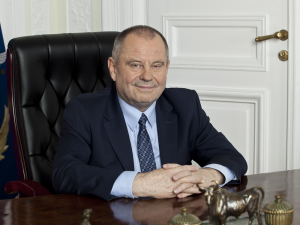
Prof. Alojzy Z. Nowak – Rector of the University of Warsaw
45th Rector of the University of Warsaw
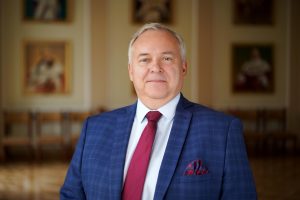
UW Vice-Rector for Cooperation and Human Resources – Prof. Sambor Grucza
Prof. Grucza graduated in German Philology (Saarland University) and Applied Linguistics (University of Warsaw). He completed his doctorate in 1994. His research interests are metalinguistics, the theory of language and communication for specific purposes, glottodidactics, translatorics and eye tracking research.
In years 2008–2012 and 2016–2020, he held the position of Dean of the Faculty of Applied Linguistics at the University of Warsaw. Previously, he was a Vice-Dean of the Faculty of Applied Linguistics and Head of the Institute of Specialised and Intercultural Communication. He is also Elector at the University of Warsaw (since 2008). Prof. Grucza is President of the Polish Association of Applied Linguistics, Vice-President of the Polnischer Germanisten Verband, and Executive Board member of the Internationale Vereinigung für Germanistik – IVG. He is also a member of Polish Linguistics Society, and Modern Language Association of Poland.
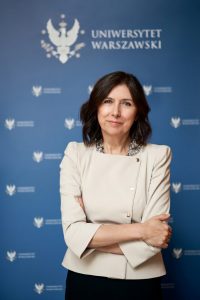
UW Vice-Rector for Development – Prof. Ewa Krogulec
Prof. Ewa Krogulec is a geologist. She holds the position of the Vice-Rector for Development of the University of Warsaw. She is the Chairwoman of the Rector’s Team for Ecology and Climate Crisis, and the Chairwoman of the Steering Committee of the Intelligent Green University Programme (IZU). Within 2012–2016 and 2016–2020, she was as the Dean of the Faculty of Geology, University of Warsaw.
In her research work she focuses on hydrogeology, and, in particular, groundwater protection and conservation. The scope of her interest is mainly concerned with the methodology and regional study of hydrodynamic modelling. Her scientific activity refers to the issue of the assessment of groundwater susceptibility to contamination, the evaluation of parameter values to hydrologic models, and processes in hydrogeological systems. As part of her research, Prof. Krogulec conducts quantitative analyses of groundwater management, identifies potential risks associated with mining and urbanisation, as well as participates in ground dependent ecosystems mapping (GDEs). She is also interested in regional hydrogeology, as well as law and economic aspects of the search for groundwater sources and their exploitation.
Prof. Ewa Krogulec is an author or co-author of about 200 scientific papers, i.e. articles, chapters of monographs, and monographs and maps. She has also been a leader of more than 40 research projects in the field of geology, hydrogeology and environmental protection.
She is the Chairwoman of the Polish Academy of Sciences Committee on Geological Sciences, the Vice-Chairwoman of the National Council of Water Management. For a number of years she has been holding the position of the Chairwoman of the Committee for Hydrogeological Documentations, an advisory body to the Ministry of Climate and Environment. She also works as a member of many scientific councils, including the Scientific Council of Kampinos National Park and Nature Conservation Council, the Mazovieckie Voivodeship.

UW Vice-Rector for Research – Prof. Zygmunt Lalak
Professor Zygmunt Lalak is Vice-Rector for Research at the University of Warsaw (since 2020) and a distinguished physicist widely recognized for his contribution to the advancement of science and the improvement of research quality in Poland.
He is actively involved in numerous national and international scientific bodies. At the national level, he chairs the University Science Commission which brings together the vice-rectors for research from 21 leading Polish universities.
Internationally, Professor Lalak represents the University of Warsaw in the Coalition for Advancing Research Assessment (CoARA), a European initiative aimed at reforming the system for evaluation of research and researchers. He also chairs the Research Working Group of the 4EU+ Alliance which is a strategic partnership of eight prominent European universities dedicated to enhancing academic collaboration and innovation. Additionally, he serves on the Board of the Central European Leuven Strategic Alliance (CELSA) which fosters joint research and academic cooperation among KU Leuven and major Central European universities.
Professor Lalak is a member of the scientific councils of several research institutions. He currently chairs the Scientific Council of the Centre of New Technologies at the University of Warsaw and the Scientific Council of the Research Centre for the Antiquity of South-eastern Europe.
For the past five years, he has overseen the Excellence Initiative – Research University programme at the University of Warsaw. This strategic project aims to enhance the quality of research and education, and to elevate the international rank of the University.
He has initiated several institutional programmes with the aim to strengthen academic staff competencies, particularly in the field of university management. As part of the University’s rectoral leadership, he is responsible for shaping and implementing the research strategy of the University; furthermore, he actively engages in national-level discussions on issues related to research funding and higher education policy. He also serves as the Coordinator of the UW Institute for Advanced Studies, which supports frontier research, attracts renowned international scholars, as well as fosters global academic partnerships.
During his tenure as Vice-Rector, the University of Warsaw has successfully renewed its right to use the HR Excellence in Research distinction, hosted the Times Higher Education Europe Universities Summit, and maintained its status as a top Polish institution participating in the EU’s Horizon Europe Framework Programme. To date, the UW researchers has been involved in 89 Horizon Europe projects, with total funding exceeding EUR 44.4 million.
As an academic, Professor Lalak has continued to play a vital role in shaping the future of research at both institutional and international levels since 1985. His scientific work focuses on Beyond the Standard Model Physics, supersymmetry in four and higher dimensions, extra-dimensional theories and branes, electroweak vacuum metastability, cosmological inflation, particle production, primordial fluctuations, and modifications of Einstein’s theory of gravity.
Throughout his career, he has conducted research at several world-leading institutions in elementary particle physics; these included CERN (Switzerland), the University of Oxford (UK), the University of Pennsylvania (USA), the Technical University of Munich, and the University of Bonn (Germany).
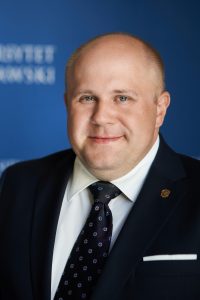
UW Vice-Rector for Doctoral and Legal Affairs – Prof. Adam Niewiadomski
Prof. Adam Niewiadomski is a lawyer and political scientist, who graduated in both fields in 2007 and 2009 respectively. He specialises in agricultural and administrative law as well as real estate economy. He has worked as a lecturer since 2007, teaching courses on agricultural law, administrative law and urban planning. Right from the beginning of his career, he has been affiliated to the University of Warsaw. In 2011, he obtained a doctoral degree in law with distinction and in 2014 a doctoral degree in linguistics. In 2018, he was awarded a postdoctoral degree in law. He is a university professor.
Since 2021, Prof. Niewiadomski heads the Chair of Agricultural Law and Food Protection System at the Faculty of Law and Administration, University of Warsaw. He is registered as an attorney-at-law. He carried out grants financed by Polish National Science Centre, such as PRELUDIUM and FUGA. For many years, he has been involved in university and national legislation, e.g. being an advisor to the Sejm’s (lower house of the Polish parliament) Committee on Agriculture and Rural Development and serving as a secretary of the Organisation and Legislation Committee of the Conference of Rectors of Academic Schools in Poland. Prof. Niewiadomski is also a member of various academic societies and organisations such as the European Council for Rural Law and the World Union of Agricultural Law.
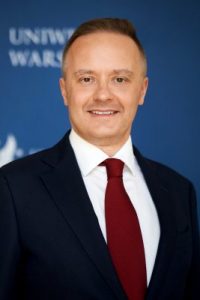
UW Vice-Rector for Student Affairs and Quality of Teaching and Learning – Prof. Maciej Raś
Prof. Maciej Raś is a political scientist, specialising in international political relations and the activity of subnational actors in IR (paradiplomacy). He has lectured at the University of Warsaw since 1999, delivering courses regarding, among others, foreign policy analysis and international relations in the post-Soviet area.
Since the beginning of his career, he has been affiliated to the Faculty of Political Science and International Studies (formerly Faculty of Journalism and Political Science), from which he graduated in 1999. He also completed the National Security Study. In 2003, the researcher was awarded a doctoral degree and in 2019 a habilitation in political science. He is a university professor.
As a part of his work at the faculty, Prof. Raś held various functions such as the Dean’s Representative on Foreign Ph.D. Candidates (2013-2020), Head of the Postgraduate Cultural Marketing Studies (2006-2014) and Head of the National Security Study. From 2020 to 2024 he was the Vice-Dean for Students Affairs.
Prof. Maciej Raś has carried out research and teaching internships, while also lecturing as a visiting professor in China, Germany, Russia and Türkiye. He has presented papers in Baltimore, Bangkok, Bonn, Chengdu, Frankfurt, Heidelberg, Jerusalem, Odesa, Moscow, Nashville, Saint Petersburg, San Francisco, Sofia and Tokyo.








